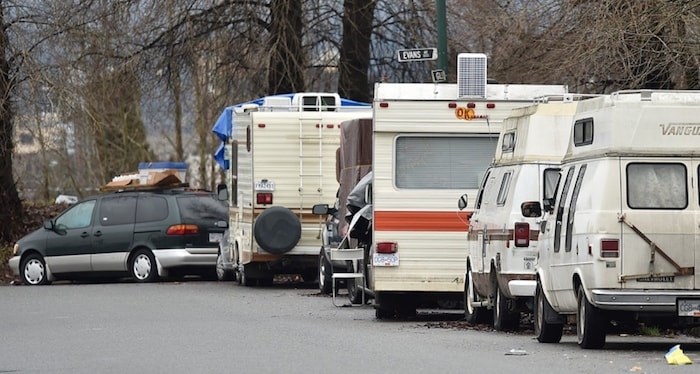 When this Â鶹´«Ă˝Ół»Courier photo was taken in February, people were living in all manner of vehicle lining the Evans Avenue-Glen Drive strip in East Vancouver. (Â鶹´«Ă˝Ół»Courier file photo)
When this Â鶹´«Ă˝Ół»Courier photo was taken in February, people were living in all manner of vehicle lining the Evans Avenue-Glen Drive strip in East Vancouver. (Â鶹´«Ă˝Ół»Courier file photo)
The City of Surrey is outlawing sleeping in camper vans parked on streets.
At a council meeting Monday, councillors voted 5-4 in favour of  to a traffic bylaw, which will “not allow or permit [a] vehicle to be occupied as a dwelling or sleeping place while parked.”
The decision allows staff to draft a new bylaw for approval. Additionally, camper vans or large vehicles will not be allowed to park for longer than 24 hours on a city street.
The vote was postponed from the last council meeting after independent councillors raised concerns about the impact on homelessness.
“It seems to be a symptom of a much larger problem, which is homelessness and the housing crisis,” said Coun. Brenda Locke, who also chairs the Surrey Homelessness and Housing Society board.
“We should not be amending bylaws that put our most vulnerable at risk” said Coun. Linda Annis at last month’s meeting.
Councillors Jack Hundial and Steven Pettigrew also voted against the new bylaw, which passed with little discussion on Monday.
The new bylaw means “unlawful” occupation of a large vehicle, including sleeping, can result in a $75 fine.
In 2017 a regional  pegged Surrey’s homeless population at 602, based on those found on the streets and in shelters. But the count has limitations and makes no mention of those bound to vehicles or in other hidden sites.
Coun. Doug Elford had previously spoken in favour of the bylaw changes on Oct. 21.
Citing his former work as an environmental officer for the City of Vancouver, Elford said it benefits the city and the environment to begin enforcement before the issue grows.
“Really, this brings us up to Vancouver’s standards,” said Elford.
Inspections of roadside camper sites showed there were “measurable” environmental impacts, said Elford. He said the expectation is for bylaw officers to be empathetic but “we need the tools in the toolbox.”
Rob Costanzo, general manager of corporate services, and Scott Neuman, acting general manager of engineering, had previously told council the city has received 27 complaints this year about “large vehicles” parked on the street. Only two of those complaints resulted in tickets after the driver refused to leave upon request from a bylaw officer. Staff determined only three of the complaints pertained to people living in the vehicle. Costanzo and Neuman’s initial report stated staff attempt to help find housing for homeless people living in vehicles by contacting shelters or RV facilities. Locke said on Monday that 200 people are to soon be evicted from the closure of a trailer park, which could add fuel to the issue.
The report said, “Given the noted bylaw restrictions that have been implemented in adjacent municipalities and the growing impact of this situation within the region, there is a strong likelihood that the City will receive an increase in these types of complaints on a more regular basis moving forward. The City presently has no means of effectively dealing with complaints of parked/occupied Large Vehicles when they are parked for less than 72 hours.”
Most recently, in July, Squamish outlawed sleeping in vehicles.
This regional trend of sleeping in vehicles (and subsequently banning the act) is not unlike a trend reported in the U.S. by the National Law Center on Homelessness and Poverty.
According to the center’s 2014 report, , banning sleeping in cars is likened to criminalizing homelessness.
The center reported that 43% of cities prohibit sleeping in vehicles, and bans on sleeping in vehicles increased by 119% between 2011 and 2014
“Sleeping in one’s own vehicle is often a last resort for people who would otherwise be forced to sleep on the streets. Cities across the nation, however, have chosen to criminalize the act,” stated the report.


